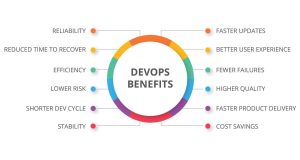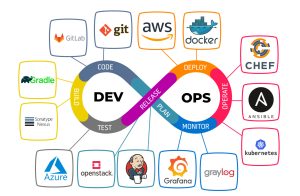Unlock Impactful DevOps Techniques to Run Organisations

Table Of Content
- Understanding DevOps in Relation to Business Development Techniques
- Core DevOps Practices Which Complement Business Development Methodologies
- Cultural Transformation: DevOps Mindset Strengthens Business Development Techniques

*Razorops
Understanding DevOps in Relation to Business Development Techniques
Companies traditionally had separate development and operations teams. It resulted in slower releases and occurred with more frequent roadblocks. In DevOps, the common barriers were eliminated through shared goals, integrated tools, and open communication. These principles also support modern business development methodologies because they rely on collaborative planning and alignment across internal teams.
Core DevOps Practices Which Complement Business Development Methodologies
Continuous Integration and Continuous Deployment: Better Business Development Techniques
CI/CD automates the builds of code, testing, and deployment. It minimizes human errors and quickens product release cycles. Thus, companies can rapidly advance new features to market-a capability crucial for powerful business development techniques that depend on speed and precision.
Automation also minimizes operational stress since it ensures updates are consistently delivered reliably. Faster delivery cycles allow organizations to respond to customer needs, aligning perfectly with modern business development methodologies that seek to improve customer engagement.
Infrastructure as Code/IaC aligned with agile business development methodologies
Infrastructure as Code refers to taking manual infrastructure configuration and turning it into automatable scripts. This brings consistency, reduces risk, and enables easy scaling. As organizations grow, IaC supports business development methodologies by ensuring that technology does not become a bottleneck.
IaC enables quick environment replication, better efficiency in testing, and reduced occurrences of downtime. This offers great enhancements to strategic business development techniques by making business operations more robust and predictable.
Automated Testing to Support Important Business Development Techniques
Automation in testing ensures stability in software, even as teams push frequent updates. Faster testing means quicker releases and fewer production issues. This reliability is crucial for business development techniques that depend on rapid and uninterrupted delivery of value.
By adding automated testing to the DevOps pipeline, organisations make their systems even more resilient. That level of efficiency directly feeds better business development methodologies and frees teams to spend more time working on innovation and customer needs.
Monitoring and Logging Integrated with Business Development Methodologies
With continuous monitoring, real-time data regarding system performance, security, and user behavior becomes available. Such data helps with quick resolutions and strategic planning. Data-driven visibility is thus indispensable for organizations adopting business development methodologies based on continuous improvements.
These monitoring tools help the teams in the early detection of anomalies and thus help to avoid major failures. In fact, operational resiliency can support advanced techniques in business development towards an end-to-end seamless user experience and trustworthy services.
Cultural Transformation: DevOps Mindset Strengthens Business Development Techniques
Collaboration and Communication supporting Business Development methodologies
Traditional development cycles are often marked by misaligned goals and communication barriers. DevOps bridges these gaps by promoting collaborative workflows. Continuous feedback is a staple, thus helping teams adapt quickly. This close alignment is akin to what lies at the heart of business development methodologies, which thrive best on cross-functional coordination.
Embracing Continuous Learning to Improve Business Development Techniques
DevOps fosters the culture of learning from failures, improving on automation, and experimenting faster. Teams analyze metrics more often, run retrospectives, and refine processes. Such habits strengthen techniques for business development and help organizations become more innovative and resilient.
Continuous learning also helps companies stay competitive by adapting to market changes quickly. An adaptive way of thinking is a central component of successful business development methodologies.
DevOps Tools That Accelerate Business Development Methodologies

*SHALB
Version control systems and their role in business development techniques
Tools like Git help manage code efficiently and allow collaboration and traceability. These capabilities support strategic business development techniques by ensuring that development teams work in an effective manner, even on complicated projects.
Version control ensures transparency and accountability, two key pillars of successful business development methodologies emphasizing structured workflow.
Containerization Boosting Modern Business Development Methodologies
Containers, for example, Docker, standardize the environment and speed up deployments. Scaling applications become easier, stable, and configuration issues are reduced. The efficiency supports fast-moving business development methodologies that rely on flexibility and innovation.
Orchestration Tools Aligned with Reliable Business Development Techniques
Tools like Kubernetes help manage containerised applications at scale. Their automation and error-handling capabilities enhance system resilience. Such robust infrastructures form a good base for solid business development techniques, especially when launching new digital services or scaling operations.
These automated orchestration solutions also align with advanced business development methodologies that make sure processes stay efficient and predictable.
The Impact of DevOps on Business KPIs and Development Strategies
Faster Time-to-Market Driven by DevOps and Business Development Methodologies
The most significant benefits of DevOps include accelerated product delivery. With rapid innovation, organizations can respond to customer needs and market changes in a short time. This capability further complements the modern business development methodology that focuses on adaptability.
Faster time-to-market also enhances business development techniques, enabling firms to attain a more competitive positioning.
Improved Product Quality: Enhancing Business Development Techniques
Better testing, automation, and monitoring by DevOps considerably improve the quality of the product. High-quality systems bring greater user satisfaction and thus less churn. These improvements directly support business development techniques aimed at building long-term customer loyalty.
Enhanced product quality also complements strategic business development methodologies by letting firms provide superior value on a continual basis.
Better Team Productivity Aligned with Business Development Methodologies
DevOps reduces repetitive tasks by automating and defining smooth workflows. This improves productivity and team morale. High-performance teams help to drive ambitious business development methodologies, which ensure organizational growth and long-term success. Increased productivity also reinforces key business development techniques, allowing teams to get more done in less time.
How Organizations Can Apply DevOps with Robust Business Development Techniques
DevOps is all about thoughtful, strategic implementation. Alignment of processes, culture, and tools at organizations is needed for successful adoption along with modern business development techniques.
Begin with Cultural Alignment to Support Business Development Methodologies
The leadership must focus on collaboration, trust, and transparency. Teams should share goals and communicate openly. Such an alignment will improve the approach for both DevOps implementation and strategic business development methodologies.
Implement Automation Gradually to Enhance Business Development Skills
Automation should start with small but critical processes. As automation expands, operational efficiency will increase. This is further in harmony with business development techniques, which call for continuous improvement.
Leverage Metrics and Data Insights to Enhance Business Development Methodologies
Organizations should monitor deployment frequency, error rates, customer feedback, and system uptime. These metrics help hone strategies and support advanced business development methodologies for sustainable growth and innovation.
Conclusion
DevOps provides one of the most powerful frameworks that enable organizations to innovate, scale, and build efficiency. Combining collaboration, automation, continuous delivery, and monitoring enables business to quickly respond to market demands and hence improves strategic business development techniques noticeably, while enabling organizations to be more productive and ensure high-quality, faster responses to customer needs.
DevOps will continue to be critical for organizations navigating digital transformation in building systems that are resilient and relevant for the long term. The synergy of DevOps with modern business development methodologies makes sure that organisations can implement operational excellence while driving strategic long-term growth.
Frequently Asked Questions
The 7 Cs of the DevOps lifecycle are Continuous Development, Continuous Integration, Continuous Testing, Continuous Deployment, Continuous Feedback, Continuous Monitoring, and Continuous Operations. These concepts define the DevOps practices for each part of the lifecycle.
Find a Program made just for YOU
We'll help you find the right fit for your solution. Let's get you connected with the perfect solution.

Is Your Upskilling Effort worth it?

Are Your Skills Meeting Job Demands?

Experience Lifelong Learning and Connect with Like-minded Professionals

